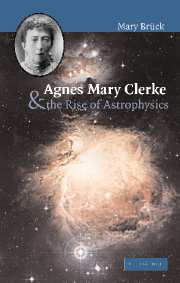Book contents
- Frontmatter
- Contents
- Acknowledgements
- Introduction
- 1 Family background in County Cork
- 2 Ireland and Italy
- 3 London, the literary scene
- 4 The History of Astronomy
- 5 A circle of astronomers
- 6 A visit to South Africa
- 7 The System of the Stars
- 8 Social life in scientific circles
- 9 Homer, the Herschels and a revised History
- 10 The opinion moulder
- 11 Popularisation, cryogenics and evolution
- 12 Problems in Astrophysics
- 13 Women in astronomy in Britain in Agnes Clerke's time
- 14 Revised System of the Stars
- 15 Cosmogonies, cosmology and Nature's spiritual clues
- 16 Last days and retrospect
- 17 Epilogue
- Notes
- Appendix
- Bibliography
- Index
15 - Cosmogonies, cosmology and Nature's spiritual clues
Published online by Cambridge University Press: 14 August 2009
- Frontmatter
- Contents
- Acknowledgements
- Introduction
- 1 Family background in County Cork
- 2 Ireland and Italy
- 3 London, the literary scene
- 4 The History of Astronomy
- 5 A circle of astronomers
- 6 A visit to South Africa
- 7 The System of the Stars
- 8 Social life in scientific circles
- 9 Homer, the Herschels and a revised History
- 10 The opinion moulder
- 11 Popularisation, cryogenics and evolution
- 12 Problems in Astrophysics
- 13 Women in astronomy in Britain in Agnes Clerke's time
- 14 Revised System of the Stars
- 15 Cosmogonies, cosmology and Nature's spiritual clues
- 16 Last days and retrospect
- 17 Epilogue
- Notes
- Appendix
- Bibliography
- Index
Summary
Nature's spiritual clues
Margaret Huggins, commenting on Agnes Clerke's Modern Cosmogonies, claimed that it was ‘not only history, but a work of philosophical thinking and of imaginative insight of a very high order’. ‘Where else’, she asked, ‘is shown in recent philosophical writing such vision and faculty divine for seizing and pointing out the reasonable spiritual clues, set in what we call Nature – clues helping to sustainment of soul in the midst of the majestic mysteries surrounding us.’ Years before, referring to The System of the Stars (1890), she had admired her friend's reverence for the Deity at a time when ‘it has become much a fashion to be really afraid to even mention the word God when science is concerned’. In that book, Agnes Clerke had referred to ‘the vision of a Higher Wisdom’, brought about by the study of astronomy, and to ‘the sublime idea of Omnipotence, to which the stars conform their courses while “they shine forth with joy to Him who made them”’.
Such pious sentiments were common enough in the writings of an earlier generation. Mary Somerville in the Introduction to The Connexion of the Physical Sciences (1834) refers to ‘the goodness of the great First Cause, in having endowed man with faculties by which he can not only appreciate the magnificence of his works, but trace with precision the operation of his laws’. John Herschel mentions ‘the Master-workman with whom the darkness is even as the light’.
- Type
- Chapter
- Information
- Agnes Mary Clerke and the Rise of Astrophysics , pp. 204 - 212Publisher: Cambridge University PressPrint publication year: 2002



